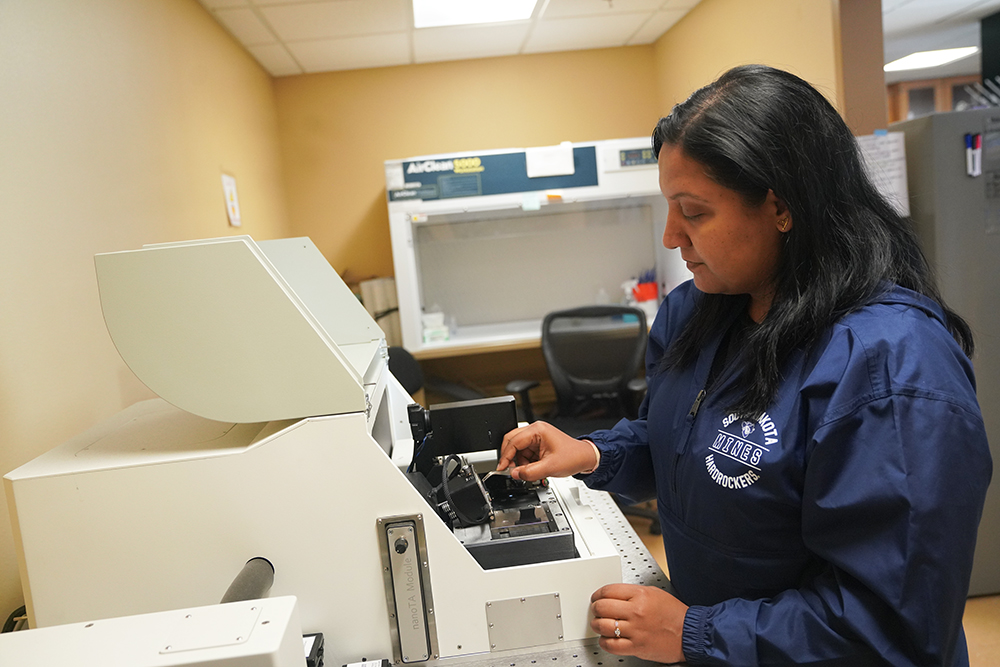RAPID CITY, SD (Oct. 30, 2025) – For the past several weeks, Aparna Banerjee, Ph.D., a professor with the Universidad Autónoma de Chile, has been on the South Dakota Mines campus working with students and faculty and advancing her research in extremophile biopolymer research.
Her visit is part of a prestigious fellowship, Concurso Interno de Estadías de Investigación en el Extranjero para Académicos Jerarquizados Asociados y Titulares 2025, awarded to Banerjee by her university to strengthen global scientific collaboration.
Banerjee, also the director of the Functional Polysaccharides Research Group (FuncPolyLab), has been working closely with Mines professor Rajesh Sani, Ph.D., leader of the Multiomics and Synthetic Biology Center (MASON) Lab, a partnership that goes back nearly a decade and includes joint work funded by the Chilean Antarctic Institute. Their shared passion is studying extremophilic microorganisms that thrive in some of the Earth’s harshest environments, from polar coasts and super salty waters to geothermal pools, and unlocking the potential of the unique biopolymers these microbes create for next-generation technologies.
Pushing the Boundaries of Biopolymers
Banerjee brought biopolymer samples from Chile derived from extremophilic bacteria. Together with Dipayan Samanta, Ph.D., Mines research scientist, her team is analyzing the surface properties of the polymers using state-of-the-art equipment in a variety of labs across campus including the MASON Lab, the Engineering and Mining Experiment Station, the Department of Chemistry, Biology & Health Sciences and Karen M. Swindler Department of Chemical and Biological Engineering.
“It has been a pleasure to interact with students here and collaborating with researchers including Drs. Dipayan Samanta, Ram Singh, Priya Saxena and Tanvi Govil, and to learn about their innovative work,” she said. “Science is truly universal and expanding collaborative networks like this is one of the most enriching aspects of research. This experience has been both scientifically and personally inspiring. It is a privilege to continuing building this strong Chile and United States collaboration, exploring the fascinating world of extremophiles and their potential biotechnological applications.”
While these microbial polymers come from some of the planet’s toughest environments, they are natural, sustainable and versatile. “By studying their structure and properties, we can inspire new materials that are cleaner, stronger and better for our world,” Samanta added. “It is remarkable how life in extreme places can guide technologies for our future.”
Building Bridges Between Continents
Beyond the research, Banerjee’s fellowship is paving the way for a long-term partnership between Chile and the United States. Mines and the Universidad Autónoma de Chile are working to formalize a Memorandum of Understanding (MoU) that will research training programs, exchange of students and faculty, hands-on access to advanced equipment and academic credit toward degrees.
“Dr. Banerjee’s visit reflects our mission to cultivate global research networks that enrich science and society,” Sani said. “These collaborations propel our work forward in energy, sustainability and biomanufacturing while also training students to thrive in a connected world.”
A Universal Language Called Science
Every image captured under the microscope and every conversation in the lab reinforces one truth – curiosity knows no borders. Banerjee’s fellowship marks just the beginning of a long-term scientific friendship.
The MASON Lab and Universidad Autónoma de Chile plan to continue co-publishing discoveries and nurturing student researchers across the borders.
“International collaboration is shaping the future of biotechnology right here in Rapid City and the molecules under the microscope might one day help shape a healthier, more sustainable planet,” Sani said.


